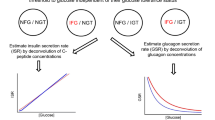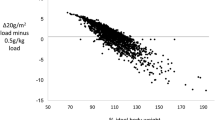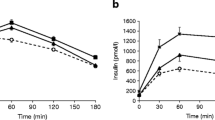Abstract.
Patients with Type II (non-insulin-dependent) diabetes mellitus manifest abnormalities in insulin action and insulin secretion. It is widely accepted that insulin resistance is an early finding, evident before the onset of hyperglycaemia and predictive of the subsequent development of diabetes. Whether abnormalities in insulin secretion also precede and predict diabetes has been debated. However, recent studies clearly indicate that early insulin secretion plays a critical role in maintaining normal glucose homeostasis. Cross-sectional analyses show that acute insulin secretory responses (AIR) to intravenous glucose are lower in subjects with impaired glucose tolerance and those at high risk for developing diabetes. Prospectively, a low AIR predicts the development of diabetes in several populations. In longitudinal studies, AIR declines dramatically as patients progress from normal to impaired glucose tolerance and ultimately to diabetes. Early insulin secretion is important for the rapid and efficient suppression of endogenous glucose production after a meal. Thus, loss of early insulin secretion initially leads to post-prandial hyperglycaemia which, as the disease progresses, worsens to clinical hyperglycaemia. Strategies that enhance early insulin secretion improve glucose tolerance and represent a novel and more physiologic approach to improving glycaemic control in patients with Type II diabetes mellitus. [Diabetologia (2001) 44: 929–945]
Article PDF
Similar content being viewed by others
Avoid common mistakes on your manuscript.
Author information
Authors and Affiliations
Additional information
Received: 27 December 2000 and in revised form: 8 April 2001
Rights and permissions
About this article
Cite this article
Pratley, R., Weyer, C. The role of impaired early insulin secretion in the pathogenesis of Type II diabetes mellitus. Diabetologia 44, 929–945 (2001). https://doi.org/10.1007/s001250100580
Issue Date:
DOI: https://doi.org/10.1007/s001250100580




